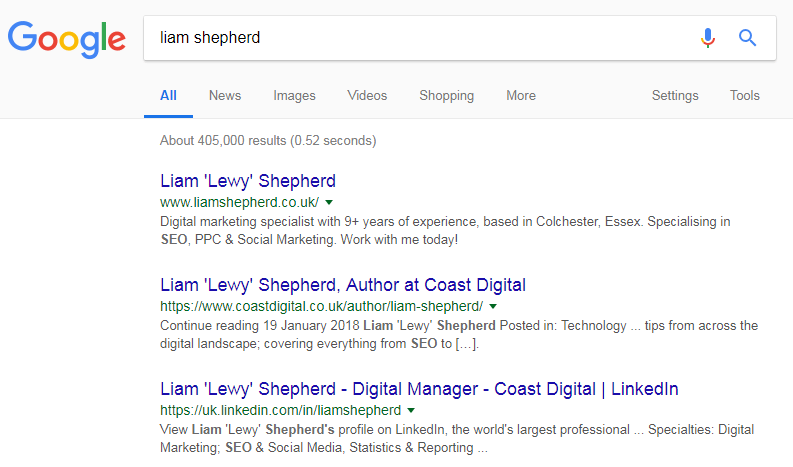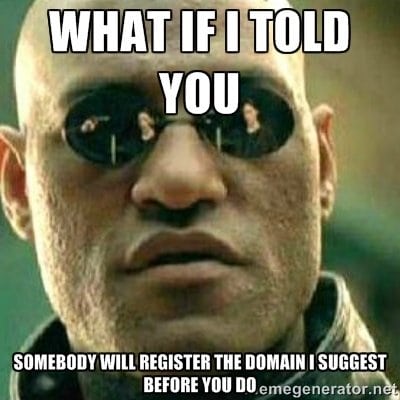One of the added benefits of my role here at Coast Digital is having the chance to speak at a variety of industry and local events.
One of these recurring opportunities has involved hosting lectures at educational organisations for students from Essex University, Colchester Institute and the Essex Business School.
In particular, these lectures have been on the topic of self-branding and managing your online reputation in the digital age.
Why is it important to control your online reputation?
We all know how essential first impressions are, and in the digital age of today it’s no different.
With your social media profiles, blogs and countless other online communities you may have once been involved with, do you truly know what people may learn when they search for you online? Do you even have any control over the websites and social profiles which they’ve come across?
If the answer is no, then it’s time to take your online reputation into your own hands instead of leaving it to chance. Here are 3 areas where you can review and ensure your online presence portrays the first impression you want to send – both professionally and personally.
1. Social Profiles
If social networks were countries then Facebook would be larger than the entire population of China. Gone are the days when social networks were a novelty pastime.
Today we rely on them for communication and staying up-to-date with current affairs. On average, every 60 seconds will see 510,000 comments, 293,000 statuses and 136,000 photos published on Facebook alone.
With the majority of users having an account for over 5 years now, it’s safe to say there is likely to be a large amount of historical content on your profile that you may not have considered could be reviewed, and judged accordingly, by others (potentially prospective employers) in the future.
So, what are employers finding on social media that’s prompting them to eliminate candidates from consideration? Well, everything from unprofessional screen names and inappropriate photos, to extremities such as racism, drink/drugs and boasting about criminal behaviour.

It’s important to review your privacy settings on all of your social profiles. This will allow you to clearly see who is able to view the content you share, and enable you to adjust it accordingly.
If you’re happy with the current persona your social profile portrays, then you can allow certain aspects to be publicly visible and vice versa. Some people prefer to keep everything private and hidden, others like to clearly show their personality online – especially if they’re using social platforms such as Twitter and LinkedIn for professional reasons.

2. Search Engine Results
Employers aren’t just limiting themselves to social networks when it comes to researching candidates’ web presences either. Today 80% of employers in the UK have admitted to searching for applicants on Google prior to inviting them for an interview, with 45% saying they do so frequently for existing employees.
A regular practice for you should be to open up an incognito window in your browser of choice, and to search Google for your name, along with variations such as the company you currently work for or your job title. What appears in the search results – are they all appropriate listings that you have control over, and are the images featured all suitable?
If the answer is no, then it’s time to consider optimisation of the content you would prefer to see when searching for yourself.

3. Domain Names
One of the best pieces of advice for assisting in protecting your reputation online is to purchase a domain which contains your full name.
This will not only enable you to dominate the search engine listings for phrases including your name more easily, but also prevent anyone purchasing the same domain name in the future and voiding the possibility of them publishing inappropriate content.
This is where many people begin to panic, because they aren’t developers and have no idea about coding a website. This can be quickly resolved by using one of the many incredible content management systems out there that are readily available to use. WordPress, for example, enables you to setup a custom domain name with WordPress installed all for £3 per month.

Conclusion
In 2012 only 34% of UK employers were using Google to research existing and potential staff. Today that figure has grown to 80%. Shying away from setting up personal websites and social profiles is no longer an option. If you aren’t in control of what appears in the search engine results for your name, then potentially content which you don’t want to be associated with may dominate those listings.
Take control of your online reputation now, and make sure you maintain how important it is that you constantly consider the visibility of the content you’re publishing via social media, or other channels – and who may be consuming it at any point.

